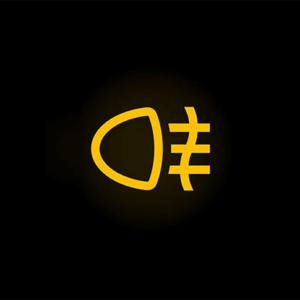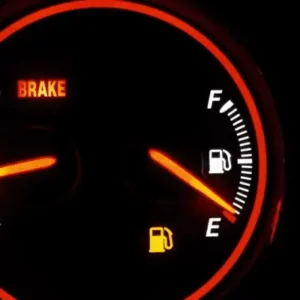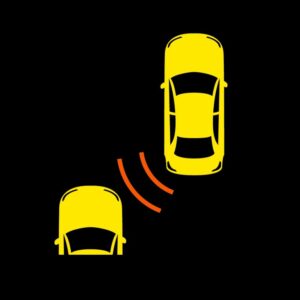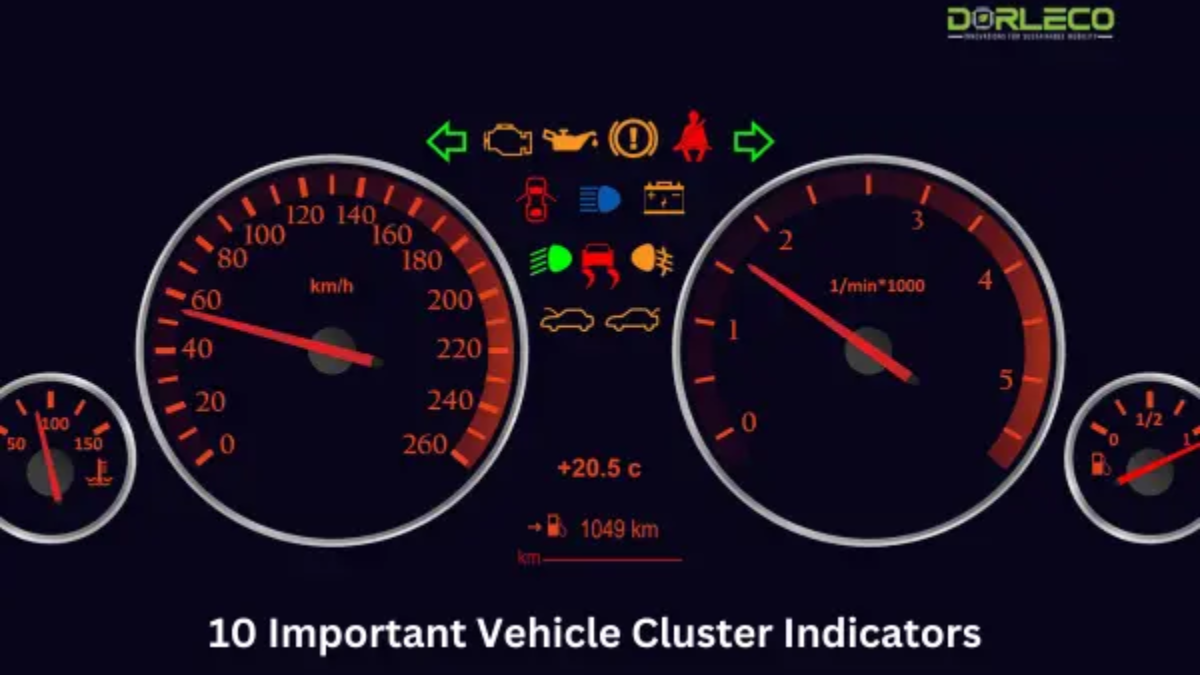Important Vehicle Cluster Indicator
Often referred to as the Vehicle Cluster Indicator, the dashboard of a car is much more than just a visual surface behind the steering wheel. It acts as the main line of communication between you, the driver, and the internal systems of your car. It notifies you of anything from regular status updates to serious safety concerns via a range of warning lights, gauges, and indicators.
Understanding vehicle cluster signs is crucial for safe driving, avoiding mechanical breakdowns, and extending the life of your car, regardless of whether you drive regularly or are an avid enthusiast. We’ll go into detail about the meaning of the most significant vehicle cluster indications in this article.
Why Do Vehicle Cluster Indicator Matter So Much?
Because they offer real-time feedback regarding the condition, functionality, and safety of the vehicle, cluster indicators are essential. Ignoring these signs may result in:
- Significant mechanical faults
- Decreased fuel economy
- Increased expenses for repairs
- Driving safety was compromised.
Being familiar with these signals can help you take prompt action, preventing minor issues from becoming serious ones.
Vehicle Cluster Indicator Categories
In general, there are three primary types for vehicle indicators:
- Warning Signs (often red or amber)
- Indicators of Status (usually Blue or Green)
- Indicators of Information (various colours, usually blue or white)
Different levels of urgency are communicated by each kind. Let’s examine each one separately.
1. Important Warning Signs
These lights frequently require quick attention or a safe halt.
Check Engine Light
Appearance: An icon in the shape of an engine.

Meaning: Could indicate anything from major engine problems to a leaky gas cap.
Take action: Take it to a mechanic or use a scan tool to diagnose right away.
Oil Pressure Warning

Appearance: The oil pressure warning is represented by the oil can icon.
Meaning: A sign of low oil pressure that may harm an engine.
Take action by stopping the car and checking the oil levels.
Alert for Battery/Charging

Appearance: An icon for a battery.
Meaning: A charging system issue (either a battery problem or an alternator failure).
Take action: To avoid procrastinating, seek out service right away.
ABS Warning Light

Appearance: “ABS” letters are how they appear.
Meaning: A problem with the anti-lock braking system.
Take Action: Drive carefully as the ABS is deactivated and the regular brakes may still function.
Warning Light for Temperature

Appearance: Thermometer symbol appearance.
Meaning: Overheating engine.
Take action: Stop, let the engine cool, then check the coolant levels to take action.
Airbag Warning Light

Appearance: A circle-shaped person (airbag).
Meaning: The airbag deployment system is flawed.
Take Action: Critically, it warns that airbags may not deploy in a crash, requiring immediate attention.
2. Crucial Status Markers
Generally speaking, these signs let you know that a particular system is operational.
Appearance: Turn Signal Indicators Look like arrows pointing left or right.
Meaning: Typically, it indicates that the turn signals are active on either the left or right side, alerting other drivers of your intended direction.
High Beam Indicator

Appearance: The blue headlamp symbol is the appearance of the high beam indicator.
Meaning: Usually, this indicates the headlights are on high beam for improved visibility.
Fog Light Indicator

Appearance: The fog light indicator features a lamp-like wavy line.
Meaning: As a result of low visibility conditions, the fog lights on the front or back are turned on to improve road clarity and ensure safer driving.
Cruise Control Indicator
Appearance: On the speedometer, the cruise control indicator resembles an arrow.
Meaning: To put it another way, the cruise control system is functioning.
Control of Traction Light

Appearance: Tire tracks that are squiggly.
Meaning: Depending on driving conditions, the system is either inactive or active—particularly under slick or slippery conditions to enhance traction and control.
3. Indicators of Information
While they usually don’t signal an emergency, these lights let you monitor how the vehicle is performing.
Fuel Level Sensor

Appearance: Icon of a petrol pump.
Meaning: Consequently, the low gasoline signal appears, indicating that it’s time to refuel to avoid running out of fuel.
4. Tachometer and speedometer
Appearance: Digital or analogue readouts.
Meaning: Generally, it shows engine RPM or speed in km/h, helping drivers track performance and ensure safety.
Trip meter/odometer

Appearance: A numerical screen.
Meaning: Generally, it displays the total mileage or the distance travelled on a certain journey, allowing drivers to track vehicle usage and trip length.
Gauge of Coolant Temperature

Appearance: Wave-shaped thermometer.
Meaning: Specifically, it monitors the engine coolant’s temperature to prevent overheating and ensure optimal engine performance.
Indicator of Gear Position
Appearance: P, R, N, D, L, or numerals (transmitted automatically).
Meaning: Typically, it shows the gear selection that is currently in use, helping the driver stay aware of the vehicle’s operating mode.
Blind Spot Monitor

Appearance: The appearance of the blind spot monitor is a car with radar waves.
Meaning: For instance, a car was found in the blind area, highlighting the need for caution when changing lanes.
Adaptive Cruise Control
Appearance: The adaptive cruise control icon looks like an automobile with speed waves.
Meaning: In ADAS systems, it adjusts to traffic by keeping a safe distance, thus enhancing safety and preventing collisions.
5. Indicators Particular to Electric and Hybrid Vehicles
Interestingly, hybrids and EVs display unique signs, highlighting their advanced systems and specialized components.
Ready Indicator
Appearance: The “READY” text appears as the ready indicator.
Meaning: The vehicle is in operation; when ready, EVs are frequently silent.
Battery Charge Level Visualisation:
Appearance: A battery icon with bars or a percentage.
Meaning: Specifically, it shows how a high-voltage battery is doing, providing insights into its charge level and overall health.
EV Mode Indicator Look:

Appearance: EV symbol or text.
Meaning: In essence, it refers to a car that runs entirely on electricity, eliminating the need for traditional fuel sources.
Regenerative Braking Indicator
Appearance: Brake symbols or arrows are the appearance of a regenerative braking indicator.
Meaning: When braking, energy is being recovered.
6. Other Valuable Indicators
Warning Sign for Door Ajar

Appearance: Car with doors open.
Meaning: Moreover, a few doors are not shut all the way, which could trigger a warning indicator and compromise passenger safety.
Seat Belt Reminder:

Appearance: A person wearing a seat belt.
Meaning: Neither the driver nor the passengers are wearing seat belts.
Tire Pressure Monitoring System (TPMS)

Appearance: In particular, it has the appearance of a tyre with an exclamation point inside of it, indicating a potential issue with the vehicle’s tire pressure.
Meaning: As a result, the tyre pressure was found to be low, which may affect vehicle stability and fuel efficiency.
Low Windscreen Washer Fluid

Appearance: Water spray symbol on a windscreen.
Significance: Additionally, it indicates a low level of windscreen washer fluid, suggesting that a refill is needed soon to maintain clear visibility.
| Color | Meaning | Urgency |
| Red | Immediate action required | Critical |
| Amber | Service soon | Important but not immediate |
| Green | System operating normally | Informational |
| Blue | Informational (e.g., High Beam) | Informational |
How to Respond If a Warning Light Is Shown
Stay Calm: Not every light necessitates an instant stop.
Evaluate the circumstances: Verify any changes in engine noise, braking, or steering.
Consult Owner’s Manual: Refer to the Owner’s Manual for an explanation of each symbol.
Seek Expert Assistance: Don’t disregard recurring cautions.
Conclusion:
Your first line of defence against unforeseen issues while driving is the Vehicle Cluster Indicator. You can safeguard your investment and the safety of others by being aware of what these symptoms signify and knowing how to react.
Never undervalue the significance of frequent Vehicle Cluster Indicator prior to embarking on a journey and always take red and amber alerts seriously. You must pay close attention to the messages your car sends you.
You’ll drive more safely, intelligently, and with more peace of mind if you remain aware and focused.


